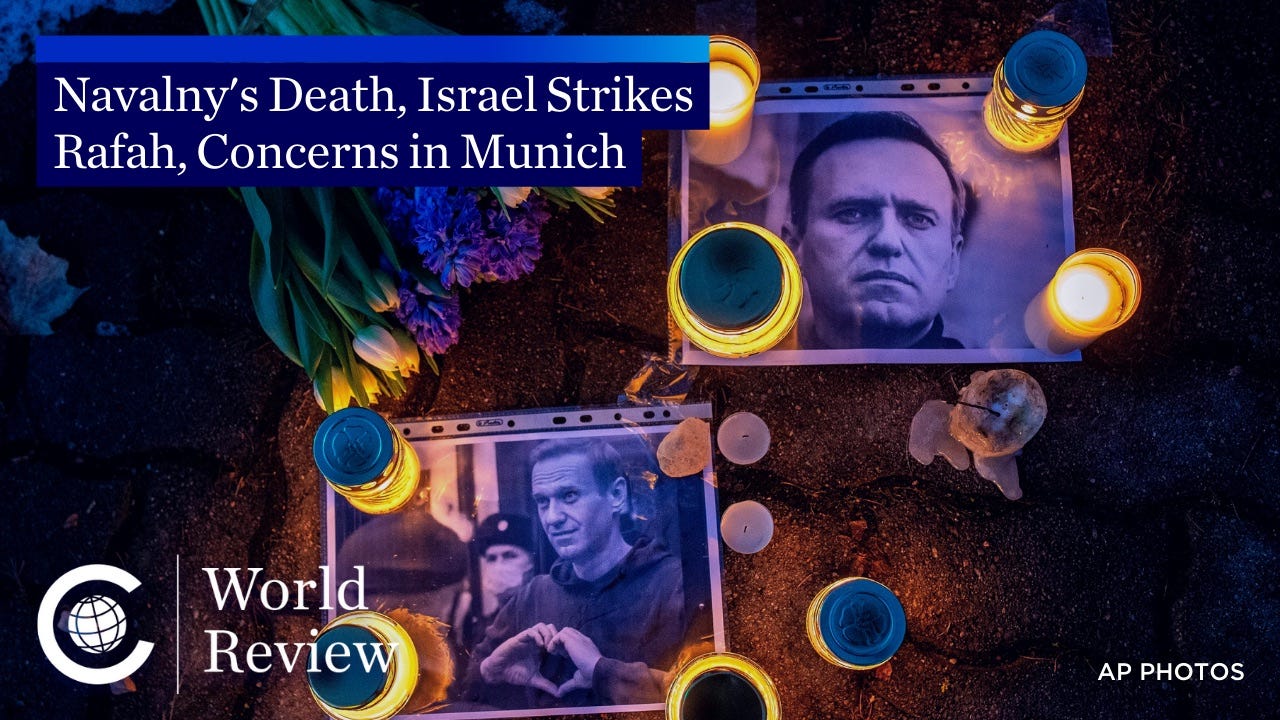World Review: Navalny's Death, Israel Strikes Rafah, Worries in Munich
A brief synopsis of this week's show
Each Friday morning, I host a video podcast called “World Review with Ivo Daalder” where three journalists from major news outlets around the world join me in discussing the latest global news stories of the week.
This morning, February 23, I was joined by Deb Amos, formerly of NPR, Karen DeYoung of the Washington Post, and Steve Erlanger of the New York Times.
While I encourage you to watch or listen to the episode (and subscribe wherever you get your podcasts!), here are three interesting things I took away from our discussion today:
The death—murder, actually—of Alexei Navalny in a Siberian penal colony once again underscores that Putin will stop at nothing to retain power. While the United States, Britain, and Europe moved quickly to impose sanctions on Russia, the reality is that Vladimir Putin is getting away with murdering his political opponents. As Deb pointed out, days after Navalny’s death, a Russian who had defected to Ukraine was gunned down and driven over by his own car in Madrid. Everyone knows who is responsible for these latest killings. Yet, no one knows what to do about it. All of this underscores that impunity is on the rise around the world—as evidenced by the publication of the second annual Atlas of Impunity by David Miliband, the former UK Foreign Secretary, who year’s ago argued that we are living in an Age of Impunity, in collaboration with the Chicago Council on Global Affairs and the Eurasia Group. The situation in Gaza, in Ukraine, in Sudan, in Ethiopia, the Horn of Africa, even within advanced industrial democracies like the United States, are causing a rise in impunity that is leaving the international community at a loss. The reason is simple: in international politics, power still talks. Or, as Thucydides wrote in the Melian Dialogue, we continue to live in a world where the strong do what they can and the weak do what they must.
The horrific developments inside Gaza are another sign of growing impunity—although here the International Court of Justice is at least hearing evidence of whether and how Israel may be violating international law. And while Israel is increasingly standing alone, facing growing criticism from around the world, the terrorist attacks of October 7 have left the nation traumatized and convinced it needs to do what it can to ensure something like this never happens again. That reality is leaving a Biden administration more and more worried about the need to end the fighting and getting hostages released with less and less options. Indeed, as Karen pointed out, the administration has drawn a number of red lines when it comes to the war and its aftermath—from no invasion of Rafah and no security buffers inside Gaza to postwar governance of the strip by a revitalized Palestinian Authority and the ultimate need for a two-state solution. But the Israeli government is driving right across every one of these red lines, as underscored by its one-page plan for “the day after.”
Finally, we talked about what happened in Munich last weekend. Steve said he had been searching for the right adjective to describe the mood there, and came up with “unmoored.” It’s an apt one. Europe feels increasingly unmoored by the reality that it is facing a daunting threat to the East and can no longer rely on its longtime security partner in the West. US officials, led by Vice President Harris and Secretary Blinken, feel unmoored by the reality that a minority of Republicans in Congress can stymie vital funding for Ukraine. Ukraine feels unmoored by the reality that it is facing a larger military foe while failing to get the necessary military assistance it needs to thwart their imperial ambitions. President Biden feels unmoored by the reality that Israeli politics and priorities are increasingly at cross purposes with maintaining regional stability and securing his reelection. The global South feels unmoored by the reality that their international voice is incommensurate with their global weight. A world unmoored is a world of growing instability, conflict, and suffering. Not a pretty picture.
That’s it for my quick takes of this week’s episode here on America Abroad. To get the full flavor, please listen to the episode itself.



